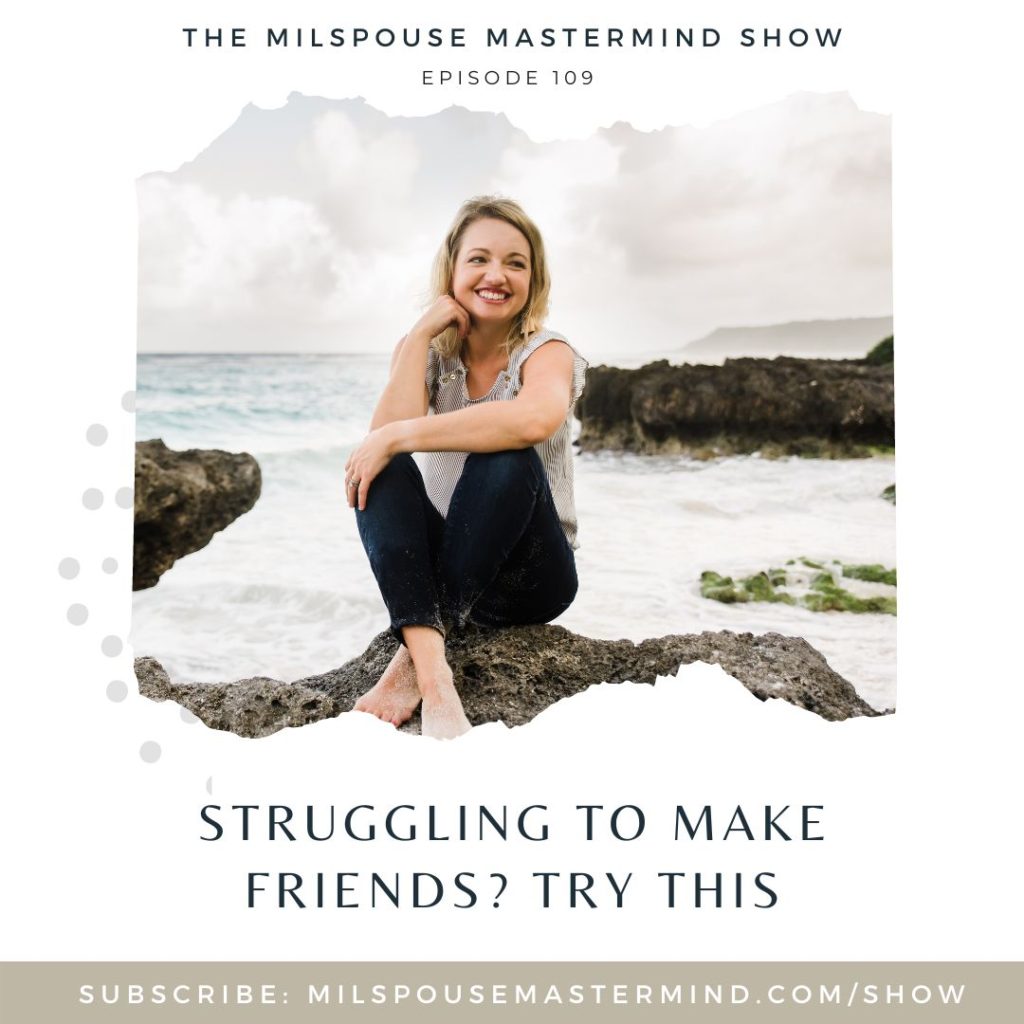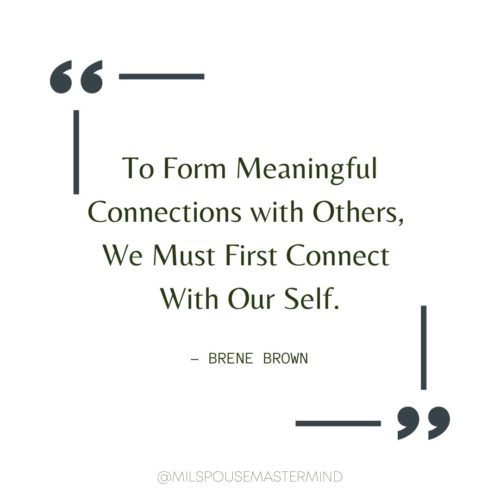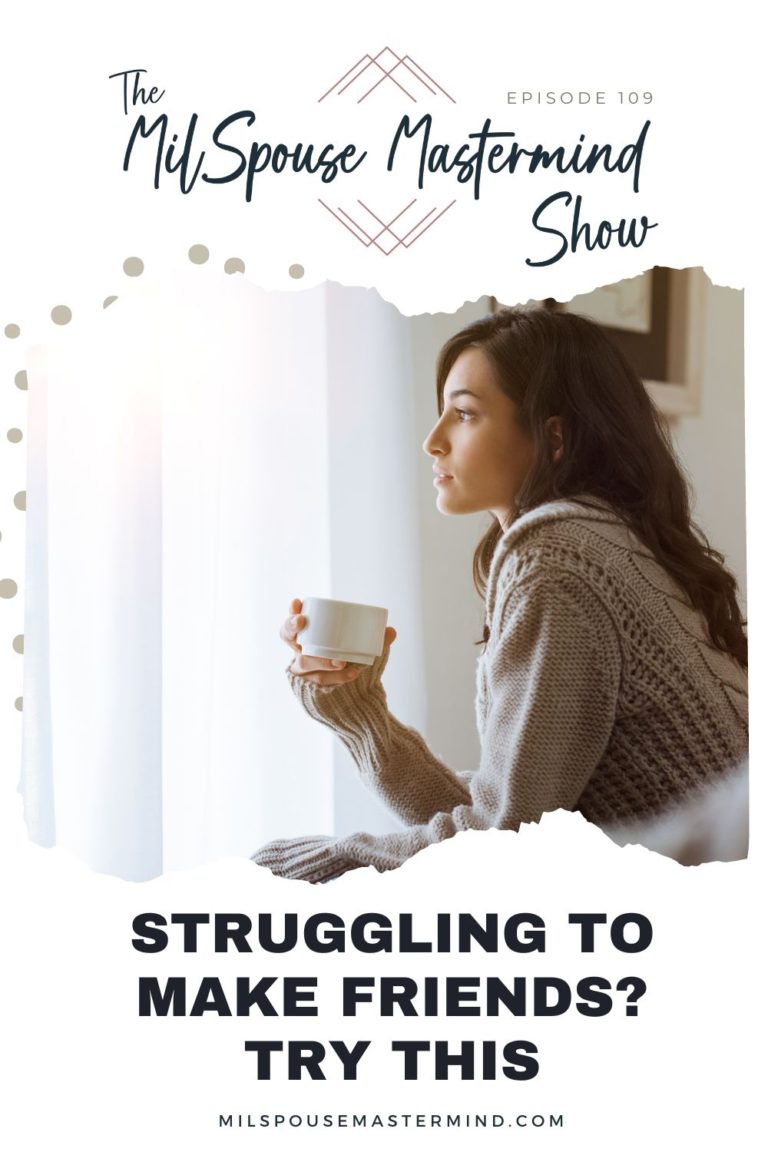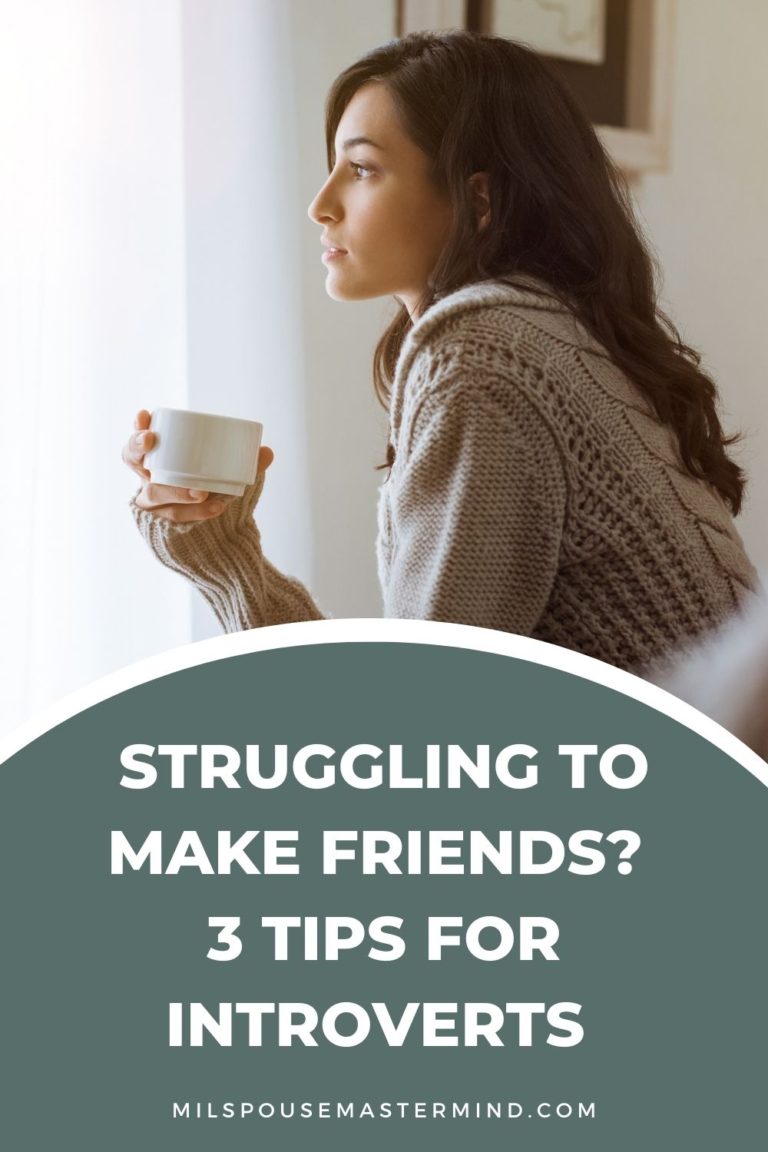
So many of us as military spouses struggle to make meaningful connections. I’m not just talking about surface small talk with neighbors, or at the spouse coffee, or with our kids’ friends’ parents. I’m talking about meaningful connections and true friendships, which is what most of us truly want.
We want to be seen, known, and understood; and we want to know others. But sometimes that can feel really hard to do, especially if we move a lot. Yes, there is absolutely value in developing relationships online, but sometimes you just want to have a friend that you can see physically or have someone you feel like you can call to come help when your spouse is gone and you have a sick kid and no way to get groceries. Building new relationships can be hard in general…and probably even harder if you view yourself as an introvert.
But this episode is not about how to get over your introversion or put yourself out there in a sea of strangers. We’re going to talk an important aspect of developing connection and friendship that isn’t often talked about. In fact, it’s one that may make extroverts squirm even more than introverts.
Learn the secret to building healthy connection with others…and three tips to help you put it into practice.

START HERE: How To Get UNSTUCK And Craft A Life With PURPOSE (FREE ASSESSMENT) https://milspousemastermind.com/growthwheel
STOP THE OVERWHELM: How to Prioritize What Matters Most to You (FREE WORKSHEET) https://milspousemastermind.com/values
FIND YOUR TRIBE: Join the Free MilSpouse Mastermind FB Community
https://milspousemastermind.com/community
DISCOVER WHO YOU ARE MEANT TO BE: MilSpouse Purpose Playbook https://morethanamilspouse.com
GET SUPPORT: Request a Get Unstuck Coaching Session hello@milspousemastermind.com
LEARN MORE: https://milspousemastermind.com
LEAVE A SHOW REVIEW: https://milspousemastermind.com/show
CONNECT VIA EMAIL: hello@milspousemastermind.com
CONNECT VIA INSTAGRAM: @milspousemastermind

[00:00:00] Christine: So many of us as military spouses struggle to make meaningful connections. And I’m not just talking about the small talk we make with neighbors or at the spouse coffee, or with our kids, friends, parents, I’m talking about meaningful connection, which is what most of us really truly want. We want to be seen to be known, to be understood.
[00:00:24] And we want to know others in return. Sometimes, and especially a lot of the time as military spouses, this can feel really hard to do. This is especially true. When we move every couple of years, the exhaustion of starting over of trying to build new relationships of the time and energy that it just takes to build that foundation of a strong.
[00:00:54] Friendship. And yes, there is absolutely value in developing these relationships with our friends that live at, in other places. But sometimes you just want someone that you can talk to physically to have someone that you can feel like you can call to help, to come over, to watch your kids, um, to be there when life is hard to be present with you.
[00:01:19] And that can be hard. All of us, but probably even harder if you view yourself as an introvert. So today I wanted to kind of shift the narrative and talk about an aspect of connection that is not just about how to get over your iion or get yourself out there in a sea of strangers so that you can start making relationships and building friend.
[00:01:48] Today. I wanna talk about an important aspect of connection that often gets overlooked and that isn’t going to make you cringe. If you’re an introvert. In fact, this may be easier for you if you’re an introvert than if you are an extrovert. The truth is whether you consider yourself an introvert, an extrovert, or an ambivert like me, you’re going to find value in today’s topic.
[00:02:15] So what do you say let’s dive into the show.
[00:03:09] All right. Welcome back to the milspouse mastermind show. I am so thankful for each of you that have taken the time to listen to the show, to leave feedback about what you wanna talk about, how the show is helping you and what you are learning in the process. The more that you give us feedback, the better this show becomes because at the end of the day, it’s here for you.
[00:03:33] It’s here to help you grow to help you thrive, to help you step into a life with purpose and help you love the life you have, not the one you wish you had. I truly believe that we are better together. And the more that we share. These truths with one another, the more that we lift each other up and encourage each other, the better we.
[00:03:58] The better off we all are so quick plug. If you would just take two seconds to share this show in your social feed or leave me review on iTunes, this would mean the world, both to me and to those whose lives will be better because you chose to share this information with them. So please do that. Just take one moment, make sure you share and.
[00:04:27] Let’s get started with today’s topic on developing connection. And how I landed on this topic. I recently read Brene Brown’s book Atlas of the heart, and she really talks about what it looks like to pursue meaningful connections in our life. And this one sentence really stood out to me. And she writes to form meaningful connections with others.
[00:04:55] We must first connect with ourselves. Our connection with others can only be as deep as our connection with ourself. So in other words, if I don’t know who I am and what I need, what I want, what I believe, then I cannot fully share. With you. So we all know that connection is important. There’s so many studies out there about how connection is important for us, how it helps us thrive, how it makes us better when we are together.
[00:05:35] But I don’t hear this talked about so much if we don’t know. Who we are. It’s really hard for us to share our full selves with others. And so I really wanted to dig into this concept of what does it look like to have a healthy connection with myself? How do we understand who we are, what we need, what we want, what we believe, how do we get clear on understanding ourselves and get in touch with ourself?
[00:06:09] So that we can truly connect with others because I think so often. As we move. So often we, we are constantly re-inventing ourself. We are growing, we are changing, we are learning new things, but sometimes it’s very easy for us to lose sight of ourselves in the process. And we wind up in this place where we don’t feel like we even know ourselves anymore and we’ve done all the things we, we are going through the motions, but do we truly.
[00:06:40] No one understand ourself. And so that’s what I really want us to focus on today because whether you consider yourself an extrovert and an introvert, an Amber vert, whatever, all of us need to take some time to really. Get in touch with ourselves to understand how we operate so that we can step into our story so that we can craft a life with purpose so that we can do the things that are on our heart so that we can discover who we’re meant to be.
[00:07:12] And so that we can cultivate meaningful connections with others. So today we’re gonna talk about three practical things you can do to get in touch with yourself, to understand yourself a little bit better and get clear on who you are, what you need, what you want, what you believe. So the first thing that we can do to really connect with our.
[00:07:39] Is to take time for rest and reflection this in our hustle and grind. Culture is one of the hardest things for us to wrap our brains around the value of rest. But when we can get in a cycle of going all the time of doing all the things and always trying to feel like we are being productive with our time, we don’t.
[00:08:06] Take the time to rest and to reflect. And I think when we actually do quote unquote, take time for rest or for doing for something for ourselves, we don’t take time for true rest. We settle for something that allows us to zone out rather than to really understand ourselves more. The true rest. The rest that our body desperately need is the rest that restores us, that refills us that helps refresh us so that we are ready to engage with the world.
[00:08:45] And, and the interesting thing about this. Is that when we are overstretched over committed, when we are in this place of burnout, then it’s really hard for us to engage in true rest. When we are in this place of exhaustion, all we wanna do is lay down on the couch, fall into the couch at night, turn on the TV, watch something right.
[00:09:10] Allowing our brains to zone out, but that’s not actually restorative to our soul and we want to engage in this rest. That’s truly restorative. And this is a process of learning how to let your body rest and how to learn, how to reflect and to let your give. Body in your brain time to actually process what’s happening.
[00:09:36] And what’s going on this act of doing nothing or doing something that is filling to your soul that fuels you rather than allows you to zone out and unplug. So perhaps that’s taking a bath in the bathtub. For me being outside. Um, especially if it involves sitting on a beach, staring at the ocean that is very restorative for me.
[00:10:04] Um, in some seasons of life, that’s been just having a cup of like a really good cappuccino in a coffee shop. That’s really restorative for me. And. But that’s, you know, not always possible in every season, sitting on the beach is not possible in every season. Um, having a nice bathtub is not possible in every season.
[00:10:24] So some of it is just saying, okay, what is available to me right now? That’s really going to restore my soul. That’s gonna give my brain and my body time to unwind. And that is really. Fueling me and filling me with life rather than just unplugging and zoning out and doing something that takes my mind off of all these other things that are going on.
[00:10:51] um, journaling is a huge thing. And, and for some of you that don’t like to write, maybe it’s voice memos to yourself, but doing something that allows your brain time to process what is actually happening. And then, and the more that we do that, the more that we journal, the more that we talk things out, the more that we come to know and understand what is making us come.
[00:11:16] What is keeping us stuck? What is holding us back? What are these things that we are struggling with? We gotta build this awareness. Um, Brene calls it an embodied awareness of ourselves. And so one of this, the first things that we have to do is carve out time for rest and reflection. This is why when we talk about the growth wheel, which I, I don’t think I’ve talked about this a lot in a few episodes, but I do have a free tool for you on the website.
[00:11:50] If you. Go to milspouse mastermind.com/growth wheel. You can download my growth wheel app. And this is, or I guess it’s not an app. It’s a little worksheet for you to go through. And it talks about all of these core areas of our life, the buckets of balance that we need to really feel this sense of fulfillment to feel.
[00:12:14] Fueled filled and full of joy and how this all works together and has to move in a clockwise motion so that as we are pouring out, we are pouring into ourself. And if we are not taking that time to do the things that are truly restorative, that truly fill us with life, then we have nothing to give others.
[00:12:37] Then we are not able to really. Pursue our purpose, or we wind up pouring out, pursuing our purpose and completely burning out in the process. And that is not what I want for you. I want you to be able to live a sustainable life of purpose, a life that lights you up and impacts the world for good. And so we have to have these healthy rhythms of pouring into ourself and the foundational component for all of that is carving out time for rest and reflect.
[00:13:11] So that’s number one is rest and reflection. The second thing that we can do to really get in touch with ourself is to know what our core values are. This is, uh, another foundational component of really understanding ourselves. What are the things that matter most to you? Not what other people say is the most important thing, or what are the.
[00:13:38] Desirable values or the best things that you should want. This is really getting in touch with who you are and how you were created, because each of us has a unique set of skills and giftings and passions, and it’s really leaning into our uniqueness and allowing our uniqueness and using that to serve others.
[00:14:04] That’s where we find. Pull thread. This line of this is leading us to our purpose and who we were created to be. And so one of those core foundational components is understanding our core values because this is what helps us make decisions for our life. That allows us to make decisions that affect how we spend our time and that help us align.
[00:14:30] What we do with who we truly are, and you can go back. I will link a couple episodes in the show notes that where we talk about who we wanna be, what our core values are, but this is a key component to really. Um, living with purpose, doing less but better. Um, there’s an episode on essentialism and how we try to do too much, but how we really prioritize what matters most to us so that we don’t feel pulled in all directions.
[00:15:02] It starts by understanding our core values. So, yes, again, I have a free resource for you. If this is something that is on your heart, go to. Mill spouse mastermind.com/values. And you can download the free value worksheet, which will be a series of questions that help you come, um, and figure out what your top core values are.
[00:15:27] What really. Lights you up and speaks to your soul and, and really gets you on that path to getting clarity on who you want to become and what your purpose is and how you can use your purpose in your current season of life. So, number one, carving out time for rest and reflection. Number two, getting clear on your core values.
[00:15:51] And then the third thing that I think is really helpful when it comes to us getting in touch with our. is this mindfulness practice. And I say, it’s a mindfulness practice because it’s not just something that you do. One time, it takes intentionality. Um, and Renee brown says embodied awareness is necessary to realign.
[00:16:17] What we do with what we believe. So when we start to get clear on our, when we take the time for rest and reflection, when we get clear on what our core values are, what matters most to us, we start to understand what it is that we believe who we want to be. And we have to re start to realign what we do, because we have all of these ingrained systems in us that are based on.
[00:16:43] Just life that has happened. Things that we have learned, the habits that we have embodied, not necessarily because they align with who we are, but just because that’s the way that we have grown up from all of the influences of our families and our situations. And these are things that are so familiar to us because we’ve done them for so long because.
[00:17:08] Thought them for so long, but that doesn’t mean that’s who we were created to be. That’s not who we’re necessarily destined to become. And so we’ve got to start to shift that so that we realign what we do with what we believe in who we are at our. Now, when we talk about practicing mindfulness, that’s a really big concept, but I have been reading so many different, um, topics and areas of expertise and everything from, you know, self-help books and psychology and personal development and, um, across all of these different fields and spectrums.
[00:17:54] This is one of the core themes that you will find again and again and again, in so much research. And so much study has been done that talks about the importance of mindfulness in our lives. Mindfulness has been shown to have positive effects on psychiatric psychosomatic, stress related symptoms. Um, positive effects on depression, chronic pain, physical health, immune response, blood pressure, cortisol levels.
[00:18:28] It’s also been shown to activate the brain regions involved in emotional regulation and, uh, it can lead to changes in the regions related to body awareness. So when we talk about mindfulness, At the most basic level, we’re really talking about the ability to be fully present in the moment aware of where we are, what we’re doing.
[00:18:56] And not overly reacting to what’s going on around us. Um, that’s just kind of like a basic level. There’s so much research and so many definitions and so many outcroppings about mindfulness, but at the court, we’re really talking about learning how to be present. To be aware and to not be overly reactive to what’s going on.
[00:19:21] And there’s tons of different ways that we can do that. Um, basic breathing will help us simply connecting with the present moment, looking around, observing what’s going on around us, observing how we feel in our body. Things like just taking a few moments to take a deep breath. These are things that I, um, really encourage my kids to learn at a young age so that this becomes their default mode.
[00:19:50] It helps calm our bodies down and helps us be more mindful and aware of what’s going. So anytime I feel a stress response to my body, then I’m immediately saying, okay, what can I do to calm myself down, to look around? What can I observe about the world around me right now? Now there is kind of the more generic, like just practicing mindfulness in our everyday life.
[00:20:22] And there’s the more formal meditation practices. And I do a little of both. I’ve talked about before in the show, how I use the app Headspace, um, it is free for military families through blue star families. I don’t know if that’s like. An extended thing, or if that is just for a particular period of time, but definitely check and see if that is still available.
[00:20:47] But that is a great app. You can do mindfulness, um, they have little exercises you can do anywhere from like three minutes to 20 minutes to help you kind of practice that mindful awareness of the world. That is so helpful. Um, if you can learn how to do that on a regular basis, that’s gonna. Such a huge difference in your life and in knowing yourself, and then ultimately what we’re really talking about, how we develop this awareness so that we can connect with others.
[00:21:19] So let’s quickly review what we’ve talked about. Three things that can really help us connect better with ourself to become more embodied and know ourselves better so that we are better able to connect with the world around us. Number. it’s really taking that time for rest and reflection. Number two, getting clear on our unique core values.
[00:21:43] Number three, developing a mindfulness practice in our life. When we do that, then we will begin to know ourselves better and we will begin to connect with others better because yes, there. Tips and techniques that we can do to connect with others better. But one of the foundational components that Brene brown talks about is developing this grounded confidence to mu move through the world.
[00:22:14] And this grounded confidence comes from really knowing ourselves and who we are and acknowledging. The uncertainty, uh, and just having humility about ourselves and being honest and open and, and having that ability to share ourselves with the world without being caught up in what others are going to think of me, of what my self-esteem is and whether, how they responded and how that impacts me.
[00:22:45] But when we. Really have that grounded confidence. We know ourselves, then we’re in a much better place to be able to reach out and connect with those around us. So that’s really what I wanted to focus on today. A little bit different take on how we can be begin to develop meaningful connections with others by truly becoming more connected and knowing ourselves.
[00:23:11] So I. This helped you. This blessed you. I would love to hear your thoughts on this episode, hop into our Facebook group. Let me know what your thoughts were, um, and how you are doing. what practices that you are taking on a regular basis to really get to know yourself better. Again, as we wrap up, if you are struggling to balance life as military spouse, if you are struggling with clarity about who you are, what you do, if you are having problems overcoming some of these mindset blocks, you need some help.
[00:23:46] Creating a plan that works for you getting unstuck and learning how to craft a life with purpose. I do offer that one-on-one coaching. Um, and if you’re not sure if you’re ready to step into that, you can schedule a free. 15 minute mindset audit, where we talk about some of those thoughts and beliefs that are holding us back.
[00:24:08] Um, that’s a great way for us to just get to know each other and see if we are a good fit to work together. If that is something that interests you just email me at hello milspouse mastermind.com. And we can get you started on that. Don’t forget if you want the values worksheet that is available. At milspouse mastermind.com/values, or if you’re interested in learning more about the growth wheel and how we truly craft a.
[00:24:36] With purpose that is also available at milspouse mastermind.com slash growth wheel. Um, I am here to support you in any way that I can. I love getting to connect with you on a weekly basis. I hope you have an amazing week and until next time may you live, filled, fueled and full of joy.

Join the MilSpouse Mastermind Facebook Community!
MILSPOUSE MASTERMIND
Get early access to podcasts, exclusive freebies & practical tips to help you thrive as a military spouse, discover what lights you up, and live a life of purpose.